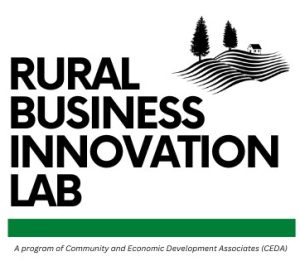By Joshua Schuetz
CEDA’s Rural Business Innovation Lab is proud to announce the selection of its first cohort, consisting of eight companies, including two nonprofits. This diverse group of businesses and organizations has been carefully chosen based on their alignment with the program’s criteria and their demonstrated interest in scaling and innovation. The selected participants are set to embark on an eight-month journey to accelerate their growth and drive positive change in rural areas.
The first Rural Business Innovation Lab cohort consists of the following entities:
- Stablefeed: A premium equine feed and supplement company.
- The Meatery: An online marketplace for meat producers and consumers.
- 3Cricketeers: A cricket farm that grows and harvests crickets for use in specialized food products.
- Makotah Veterinary Center: A rural veterinary center that provides services for a mixed variety of animals.
- Perennial Pantry: A startup working to develop and market kernza grain products.
- Clear Water Nitrate Reduction: An environmental engineering and services company specializing in innovative conservation practices.
- Depot Studios: A nonprofit specializing in processing milkweed pods for garment insulation products.
- Southeast Minnesota Food Rescue and Redistribution: A nonprofit that works with startup farmers from culturally diverse backgrounds, emphasizing indigenous products and practices.
Robert Harris, CEDA’s Director of Strategic Initiatives, explained that the selection process involved collaboration with regional partners and advertising efforts. The cohort’s formation was a natural outcome, with applicants chosen based on their alignment with program goals and their potential for growth and innovation.
The first convening of the cohort took place on Friday, marking the kickoff event. During this gathering, participants had the opportunity to reflect on their goals and set specific objectives for the upcoming eight months. The program will focus on providing personalized one-on-one support and will include three to four workshops to further enhance participants’ skills and knowledge.
Addressing the program’s objectives, Harris highlighted, “All of these businesses have connections to sustainability and addressing climate change, and part of the goal is to accelerate this climate economy.” He further emphasized two challenges entrepreneurs face that the program aims to address, stating, “It’s two things: access to capital in terms of equity investments, and knowledge on putting operations in place to be able to scale.”
The program is funded through CEDA’s partnership with Compeer Financial, a dedicated supporter of rural communities and businesses.
CEDA’s Rural Business Innovation Lab is committed to supporting rural entrepreneurs and fostering economic growth. With a focus on sustainability, climate change mitigation, and operational scalability, the program sets the stage for the participating businesses and nonprofits to thrive and make a lasting impact in their communities.
“Our overall goal is to help rural entrepreneurs grow their businesses in the place where they want to grow,” Harris said. “I think innovators are often pushed out of where they want to grow, but with covid we saw that people can run a business from anywhere in the world.”
